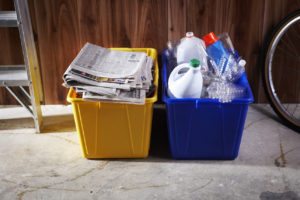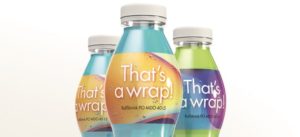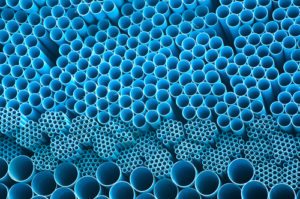 A report from The Recycling Partnership and U.S. EPA lays bare the reality there is no silver bullet for creating a stellar curbside recycling program. That being said, researchers did paint a detailed portrait of what successful programs look like.
A report from The Recycling Partnership and U.S. EPA lays bare the reality there is no silver bullet for creating a stellar curbside recycling program. That being said, researchers did paint a detailed portrait of what successful programs look like.

 Associate Editor Jared Paben has worked for Resource Recycling since December 2014. Most of his earlier career was spent as a reporter for the daily newspaper in Bellingham, Wash., but he also has experience working for the Oregon volunteerism commission and for Oregon nonprofits serving low-income populations. He can be contacted at [email protected].
Associate Editor Jared Paben has worked for Resource Recycling since December 2014. Most of his earlier career was spent as a reporter for the daily newspaper in Bellingham, Wash., but he also has experience working for the Oregon volunteerism commission and for Oregon nonprofits serving low-income populations. He can be contacted at [email protected]. A report from The Recycling Partnership and U.S. EPA lays bare the reality there is no silver bullet for creating a stellar curbside recycling program. That being said, researchers did paint a detailed portrait of what successful programs look like.
A report from The Recycling Partnership and U.S. EPA lays bare the reality there is no silver bullet for creating a stellar curbside recycling program. That being said, researchers did paint a detailed portrait of what successful programs look like.
 UPM Raflatac has unveiled shrink-sleeve labels that avoid causing problems in today’s PET bottle recycling processes.
UPM Raflatac has unveiled shrink-sleeve labels that avoid causing problems in today’s PET bottle recycling processes.
 The federal government will invest up to $70 million in a new research institute focused on boosting recycled content in manufacturing and reducing recycling costs.
The federal government will invest up to $70 million in a new research institute focused on boosting recycled content in manufacturing and reducing recycling costs.
 A new sortation system from Bulk Handling Systems automatically separates film products for recycling so they’re not later lost as residue in a fiber stream. Continue Reading
A new sortation system from Bulk Handling Systems automatically separates film products for recycling so they’re not later lost as residue in a fiber stream. Continue Reading
 Italian melt filter company Fimic has developed a filter technology to tackle a tough plastics stream: PVC from electrical cables. Continue Reading
Italian melt filter company Fimic has developed a filter technology to tackle a tough plastics stream: PVC from electrical cables. Continue Reading
 North American reclaimers boosted recycling of PET thermoforms last year, despite difficulties the packaging has in the way of look-alike resins, contamination and labels. Continue Reading
North American reclaimers boosted recycling of PET thermoforms last year, despite difficulties the packaging has in the way of look-alike resins, contamination and labels. Continue Reading
The latest optical sorter released by Pellenc Selective Technologies features easier access for maintenance and improved air valve capabilities. Continue Reading
An improvement in virgin feedstocks allows better performance in recycled-content HDPE products, and two companies cooperate to supply a continuous PET-to-textile-fibers line.
Improved HDPE: Total Refining & Chemicals has developed an enhanced virgin HDPE meant to be compounded with recycled plastic because it is able to over-compensate for any deficiencies in the recycled resin. Beveragedaily.com reports on the advancement, which yields recycled-content packaging with properties that overperform virgin HDPE.
Additional additives: Additives company Struktol has released new formulations aimed at aiding the use of recycled plastics. The various additives can be used in a range of plastics, including polyolefins and engineered plastics, and they are suited to compounds with up to 100 percent recycled material.
Equipment for mixed, dirty plastics: An Australian inventor has created a piece of equipment capable of recycling various resins and contaminated plastics all mixed together, according to Plastics News. Meanwhile, while he refines that technology, a company he is a member of is currently selling a different innovation: building products made partially from ABS from electronics.
Equipment company cooperation: Equipment companies Erema and Trüetzschler Group have signed a deal to work together to supply equipment lines to recycle PET into bulk continuous filament (BCF). Last year Trutzschler and Erema jointly developed a plant to convert recycled PET into carpet yarns.
From contaminant to construction: A U.S. startup called ByFusion is recycling plastics collected from the ocean into blocks for use in construction or road barriers. Portable gas- or electricity-driven equipment is used to compress the blocks into custom shapes and densities, regardless of the material mix or cleanliness, according to inhabitat.com.
Production scrap recycling: German equipment company Gneuss Kunststofftechnik offered details on its new plastics recycling equipment, including a new “Jump” system that’s installed directly downstream from the company’s extruder and melt filter and improves recycling of production scrap. The Jump system provides an alternative to conventional SSP systems and enables direct reintroduction of unused PET into the production process without the need to re-melt it.
PET recycling plant: A new PET recycling facility near Aachen, Germany utilizes advanced grinding and washing equipment from Krones, the company announced. The facility is being opened by a major German soft drink producer, Mitteldeutsche Erfrischungsgetranke GmbH & Co. KG (MEG), which is already recycling PET bottles collected at grocery stores but wants to boost the volume of recycled resins available to it.
 International labels company UPM Raflatac has been in the news for its work developing recycling-friendly labels for beverage containers. Continue Reading
International labels company UPM Raflatac has been in the news for its work developing recycling-friendly labels for beverage containers. Continue Reading
The U.S. Food and Drug Administration cleared the way for a U.S. company to recycle PP and HDPE buckets and lids into food packaging. It also signed off on a Japanese company’s plan to recycle expanded polystyrene (EPS) trays into new PS food trays.
Those were two of the “go-aheads” included in letters of no objection (LNOs) issued by the FDA during the first half of 2016.
In all cases, the FDA determined the recycling processes would result in contaminant concentrations of 0.5 parts per billion or less in the food, below its “threshold of regulatory concern.”
In this twice-yearly roundup, Plastics Recycling Update: Technology Edition takes a closer look at the four recent LNOs (a previous roundup of LNOs is available online).
The FDA issued two LNOs to Germany’s Fraunhofer Institute for Process Engineering and Packaging (Fraunhofer IVV), which applied on behalf of two different companies: Polymetrix AG of Switzerland and FP Corp. of Japan.
Both were in regard to a secondary recycling process called Super Clean, although they involved different resins.
The March 8 LNO for Polymetrix confirmed the Super Clean process will produce recycled PET suitable for use in food packaging at up to 33 percent recycled content. The LNO is for feedstock that includes post-consumer PET containers (excluding industrial/chemical containers).
The April 1 LNO for FP Corp. confirmed the process would produce recycled PS suitable for use in trays and non-expanded sheets at up to 100 percent recycled content. The packaging would be limited to room temperatures and below.
The LNO determination was for feedstock consisting of expanded PS trays previously used for holding fruits, vegetables, marine products, meat, deli foods, processed foods, confections and bread. It excluded the use of colored PS.
During the second half of 2015, the FDA issued four similar letters for the Super Clean process to companies in Austria, Germany and Japan.
On March 9, the FDA issued an LNO to Keller and Heckman LLP, which applied on behalf of Plastic Cycle/Green Mind (PC/GM). The application covered PC/GM’s process for recycling PET for use in single-layer food trays, containers and clamshells to hold raw fruits, vegetables and eggs with their shells still on.
The process was described as a typical secondary recycling process that includes sorting, metal separation, hot-caustic wash and surface drying.
The feedstock would include PET beverage bottles, but it would exclude bottles for juices, sport drinks and other multi-layer bottles that might contain oxygen- and UV-barrier layers.
The LNO noted the containers would hold the foods for short periods of time at room temperature or below.
The FDA issued an LNO on May 10 to Keller and Heckman, which applied on behalf of Arkansas-based Ecotech Consumer Products. It covers Ecotech’s process for recycling PP and HDPE for food packaging at up to 100 percent recycled content.
The feedstock was described as PP and HDPE buckets and lids used to supply bulk icing to retail bakeries. The recycling process was described a typical secondary recycling process that doesn’t use any additives.
The new packaging is suitable for use in cold, room or hot temperatures, according to the FDA.
An FDA database contains information on all past LNOs.
